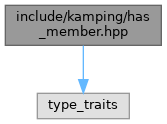|
KaMPIng 0.2.1
(Near) zero-overhead MPI wrapper for C++
|
|
KaMPIng 0.2.1
(Near) zero-overhead MPI wrapper for C++
|
Macros for generating concept-like type traits to check for member functions of objects. More...
#include <type_traits>

Go to the source code of this file.
Macros | |
| #define | KAMPING_MAKE_HAS_MEMBER(Member) |
| Macro for generating has_member_xxx and has_member_xxx_v templates. They return true if the type given as template parameter has a member (template) function provided name. | |
Macros for generating concept-like type traits to check for member functions of objects.
| #define KAMPING_MAKE_HAS_MEMBER | ( | Member | ) |
Macro for generating has_member_xxx and has_member_xxx_v templates. They return true if the type given as template parameter has a member (template) function provided name.
If the function has no template parameters or they can be auto-deduced, use has_member_xxx::value or has_member_xxx_v, if not use has_member_xxx::value_with_template_params<...>.
If the member function takes arguments, pass their types as additional template parameters to has_member_xxx.
See the examples for details.
Example:
Explanation:
value, the static member function test is instantiated using the given type Type.Type and try to call the expected member function with instances of the passed MemberArgs.test_with_template_params also instantiates the functions template parameters with the passed types.decltype, and cannot instantiate std::void_t<...>, which fails to initialize the whole function test(int).test(long), which returns std::false_type.std::true_type.test has int and long overloads to resolve ambiguity. Passing 0 to test ensure that we first try to instantiate the true variant.